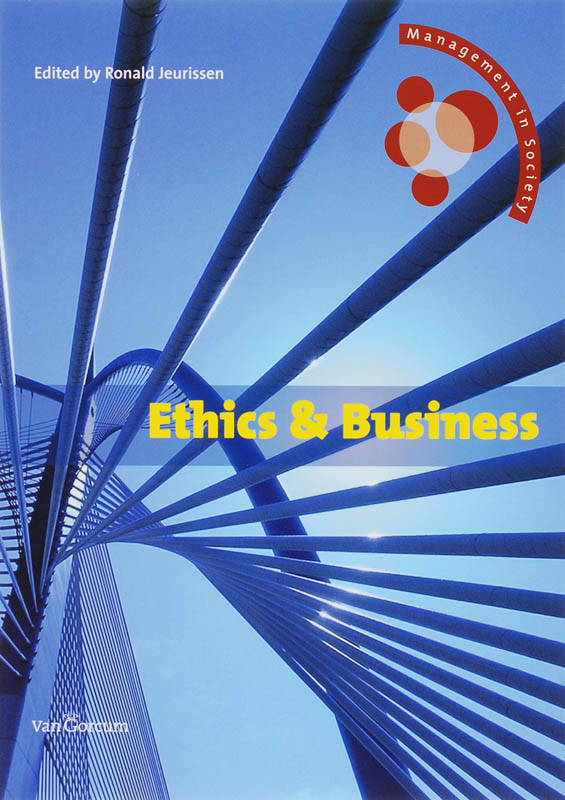Samenvatting
"Today, being designated a good company entails not only striving for continuity and profitability, but also having an eye on integrity and social responsibility.
Companies are increasingly called to account on their role in society and their environmental impacts.
Public debates and stakeholder dialogues on these issues abound. Societies are becoming more complex, and companies are constantly confronted with new dilemmas, resulting from new scientific and technological developments and globalisation.
Ethics & Business describes and analyses these developments from an ethical perspective, involving comprehensive casuistry. Strategies and tools are discussed that help businesses improve the ethical quality of their decision making, such as integrity training and social and ethical audits. The book offers a fundamental framework for understanding the recent developments in integrity management and corporate social responsibility and how to put these into practice.
In 2002, Ethics & Business won the J.J.F. van den Bergh Prize for best book in applied behavioural science. The jury wrote:
In spite of its complex subject matter, the books pleasant writing style and the inclusion of easily recognisable examples make it very readable. Ethics & Business is highly recommended to every entrepreneur who, as any entrepreneur should, engages in self-reflection and reflection on the business actions from time to time. This type of book should be part of every self- and society-respecting companys library.
This English edition is based on the sixth Dutch edition, that was completely updated and revised in 2006.
Editor
Ronald Jeurissen is professor of Business Ethics at Nyenrode Business Universiteit.
The series Management in Society treats academic and practical subjects in the fields of business ethics and corporate social responsibility, with the aim of deepening theoretical understanding and offering practical support to directors and managers. The series originated from the strategic alliance between the European Institute for Business Ethics, a division of Nyenrode Business Universiteit, and PricewaterhouseCoopers Sustainability Solutions Department.
Ethics & Business
Foreword to the English Edition 1
Introduction 3
Part 1 Principles
1 Business ethics and corporate social responsibility
1.1 Society demands corporate responsibility
1.2 The business ethics perspective
1.3 Ethics and profit
1.4 Is legislation not enough?
1.5 Corporate social responsibility
2 Moral responsibility in organisations
2.1 Definition of moral responsibility
2.2 Factors influencing moral responsibility within the organisation
2.3 Managing responsibility
2.4 The moral responsibility of organisations
3 Integrity
3.1 Integrity and trust
3.2 Integrity as a professional responsibility
3.3 Managing integrity
4 Values and moral norms in organisations
4.1 Values, virtues and moral norms
4.2 Moral principles
4.3 Moral rights
4.4 Justice
4.5 Utilitarian ethics
4.6 Conflicting moral principles
4.7 Moral dilemmas
4.8 Care
4.9 Are moral judgements subjective?
5 Corporate social responsibility and strategy
5.1 Corporate social responsibility or profit maximisation?
5.2 Competitive strategies for corporate social responsibility
6 Business stakeholders
6.1 Economic and social stakeholders
6.2 Stakeholders and governance
6.3 Stakeholder dialogue and co-operation
Part 2 Applications
7 Responsibility towards consumers
7.1 Product responsibility
7.2 Consumer growth (but not in a good way)
7.3 Advertising and ethics
8 Responsibility towards and of employees
8.1 Established employee core rights
8.2 Employer and employee responsibilities
8.3 Responsibility towards employees in case of job insecurity and redundancy
9 Environmental responsibility
9.1 Phases in environmental management
9.2 The environment and self-interest
9.3 Aims of environmental policy
9.4 The limited regulatory power of the government and the market
9.5 Corporate self-direction
9.6 Collective responsibility towards sustainability
10 Handling corruption and gifts
10.1 Corruption: a world wide problem
10.2 Morally wrong and illegal
10.3 Bribery, extortion, grease payment or gift?
10.4 How can companies fight corruption?
11 Ethics and international business
11.1 Western businesses and developing countries
11.2 Doing business in other cultures
11.3 Business and human rights
11.4 A theoretical framework for international business ethics
12 Investors and the need for openness and transparency
12.1 The growing interest in ethics and investment
12.2 Different investors, different information needs
12.3 The development of responsible investment
13 Organising ethics
13.1 Approaches to making employees act responsibly
13.2 Codes of conduct
13.3 Social accountability
Cases
Obviously
a major malfunction 32
Whistleblowing in the European Commission 37
A cold winter 54
Nuons CO2-emission rights 80
Eastern line dilemma 82
Islamic feasts 83
Caught in the act 89
The Ford Pinto 98
Child labour, the Socialist Party and IKEA 103
SBM Offshore in Burma 103
Cheapest is best? 107
Good citizenship at Fuji Photo Film 110
The consulting panel for urban renewal 110
C&A and responsibilities in the supply chain 113
NS wants to have its cake and eat it 115
Unilever plays Santa 120
Shells social commitment in Nigeria 124
Mondragon: a democratic experiment 130
NAM sets up internet dialogue about the future 134
Nuons social dialogue 134
ABN-Amro and palm oil 134
IKEA and Unicef rally against child labour 135
Okay oranges 137
Misleading advertisement for Priority Telecom 152
The Vespa buzz 155
Ban on football shirts sponsored by beer brands 156
Dumpjeschatje.nl is shocking and improper 157
Nike claims underground station 163
Dove: debate as a marketing tool 164
The black box 176
Renault-Vilvoorde: reversing a disaster 180
Gulpener beer: an example of individual self-regulation 193
Marine Stewardship Council 194
Handling gifts 209
Female textile worker from Bangladesh 212
Taboo on women in business 213
The Ogoni and Shell 213
TNT and the UN fighting hunger 220
Why Heineken did not invest in Burma 229
DBCP: a pesticide hard to control 237
"




